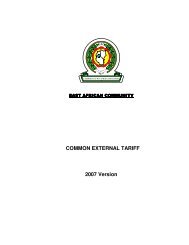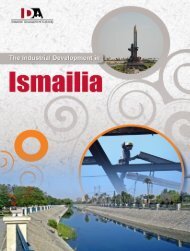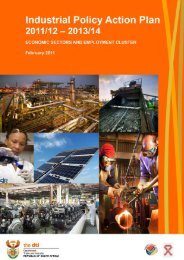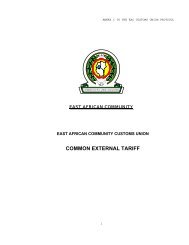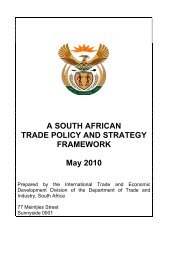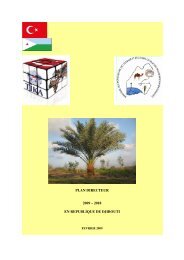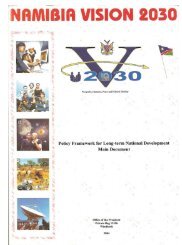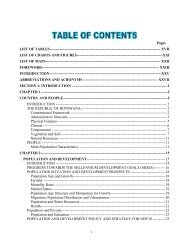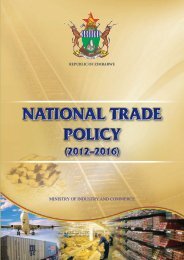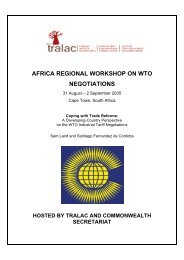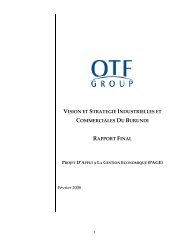rwanda national export strategy - minicom
rwanda national export strategy - minicom
rwanda national export strategy - minicom
Create successful ePaper yourself
Turn your PDF publications into a flip-book with our unique Google optimized e-Paper software.
RWANDA NATIONAL EXPORT STRATEGY<br />
with rising roasted coffee sales at close to a median US$10 per 250 gram packet, China could be an<br />
attractive <strong>export</strong> market for Rwandan coffee. A joint venture with a Chinese counterpart to import,<br />
process, market and distribute Rwanda Coffee on the Chinese market could allow estimated gross<br />
earnings of between US$5.7 and US$9.6 per kilogram.<br />
Issue #3 Foreign policy and commercial interests need to be aligned. Improved coordination is<br />
needed between the Ministry of Foreign Affairs and Cooperation, the Ministry of Trade and Industry, the<br />
PSF and the RDB. The placement of Rwandan Missions abroad should be closely aligned with Rwanda‘s<br />
trade policy and its investment and <strong>export</strong> promotion strategies. Rwandan Missions could be more<br />
effectively leveraged for market development and access, as well as promoting priority sectors and<br />
products. This can be done through securing buyer contacts, cold calling, market research, and product<br />
show casing. Rwandan missions abroad can also play a key role in helping Rwanda‘s businesses source<br />
appropriate technologies, and identifying new market opportunities for Rwandan <strong>export</strong>ers.<br />
4.2.2 TRADE FACILITATION & PROMOTION<br />
Trading Across Borders, as identified by the World Bank‘s Doing Business report, remains a difficult<br />
issue for Rwanda, ranking 159 th of 183 countries surveyed. 22 The criteria and Rwanda‘s performance<br />
provide an assessment of Rwanda‘s challenges:<br />
Figure 3: World Bank’s Doing Business Survey – Trading Across Borders Best Practices<br />
Good<br />
Practice<br />
Economies<br />
Documents<br />
to <strong>export</strong><br />
(number)<br />
Time to<br />
<strong>export</strong> (days)<br />
Cost to<br />
<strong>export</strong><br />
(US$ per<br />
container)<br />
Documents<br />
to import<br />
(number)<br />
Time to<br />
import<br />
(days)<br />
Cost to<br />
import<br />
(US$ per<br />
container)<br />
Denmark 4 5 $744 3 5 $744<br />
France 2 9 $1,078 2 11 $1,248<br />
Malaysia 7 18 $450 7 14 $450<br />
Singapore 4 5 $456 4 4 $439<br />
Switzerland 4 8 $1,537 5 9 1,540<br />
OECD 4.4 10.9 $1,059 4.9 11.4 1,106<br />
Botswana 6 28 3,010 9 41 3,390<br />
Sub-Saharan<br />
Africa<br />
7.7 32.3 $1,962 8.7 38.2 $2,492<br />
Rwanda 8 35 $3275 8 34 $4990<br />
The table above compares Rwanda‘s performance in each indicator to the inter<strong>national</strong> best performers in<br />
each class, as opposed to the performance of its neighbours. It should be noted however that Rwanda will<br />
almost certainly always be at a relative disadvantage in terms of transport costs, due to its land-locked<br />
position and associated distance to sea ports. The table also compares Rwanda‘s performance with other<br />
land-locked countries such as Switzerland and Botswana, which rank 43 rd and 151 st on the trading across<br />
borders indicator. The GoR therefore needs to provide assistance to enable Rwandan <strong>export</strong>ers to compete<br />
more favourably in the global and regional market. An important component of this assistance will<br />
include targeting cross-border trade with DR Congo and Burundi as well as other neighbouring countries.<br />
The activities identified under trade facilitation and promotion aim at making <strong>export</strong>ing easier for the<br />
Rwandans. This goes beyond addressing border measures and may involve initiatives such as providing<br />
22 Data from World Bank‘s Doing Business 2011 Report. It is important to note that the methodology for this metric does not measure the<br />
requirements to trade with one‘s regional neighbours but rather the, ―requirements for <strong>export</strong>ing and importing a standardized cargo of goods by<br />
ocean transport‖, thus Rwanda is at a comparative disadvantage in terms of the ranking methodology, in that unlike the rest of the countries listed,<br />
it does not have sea access.<br />
Page 16



